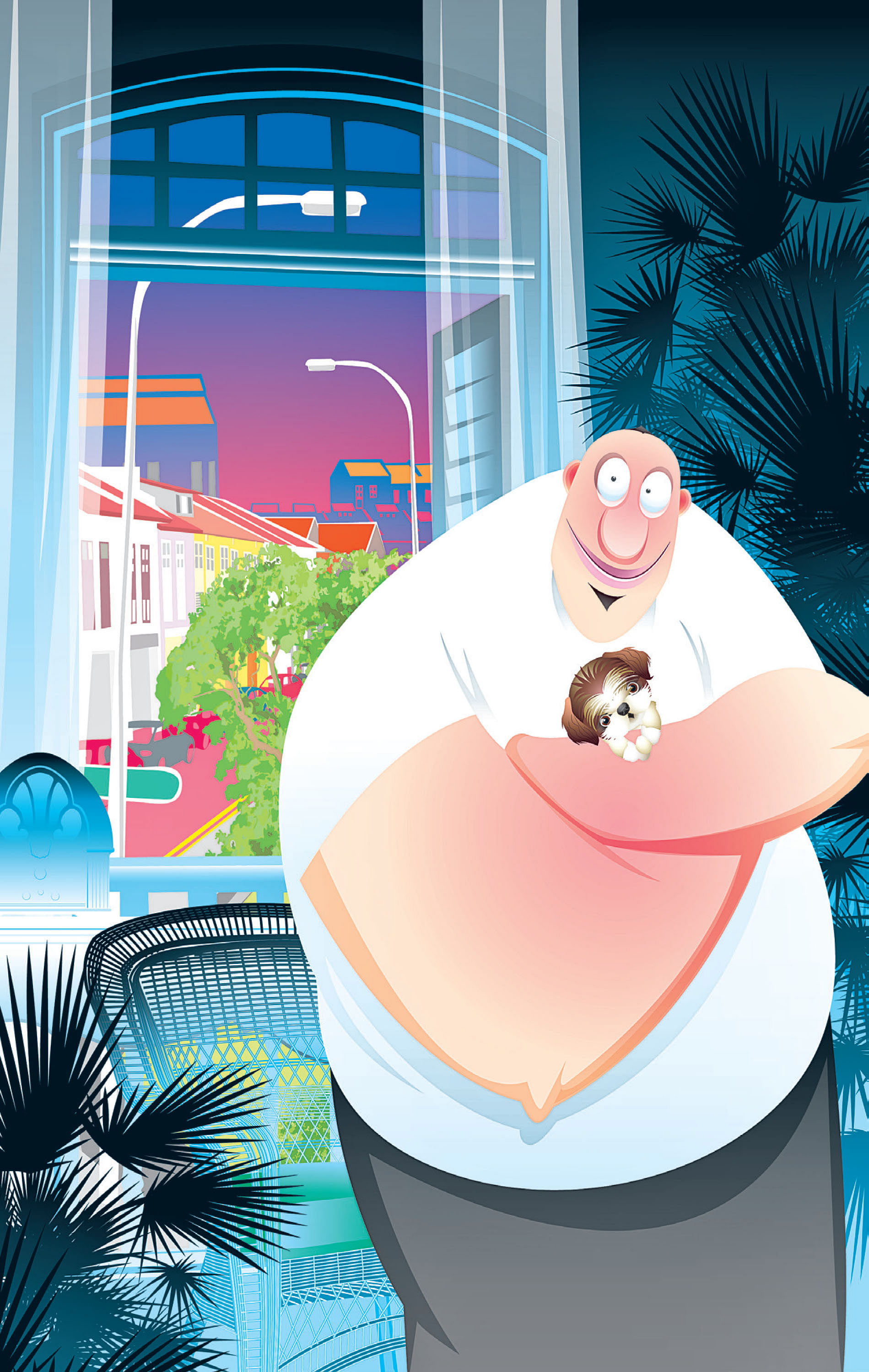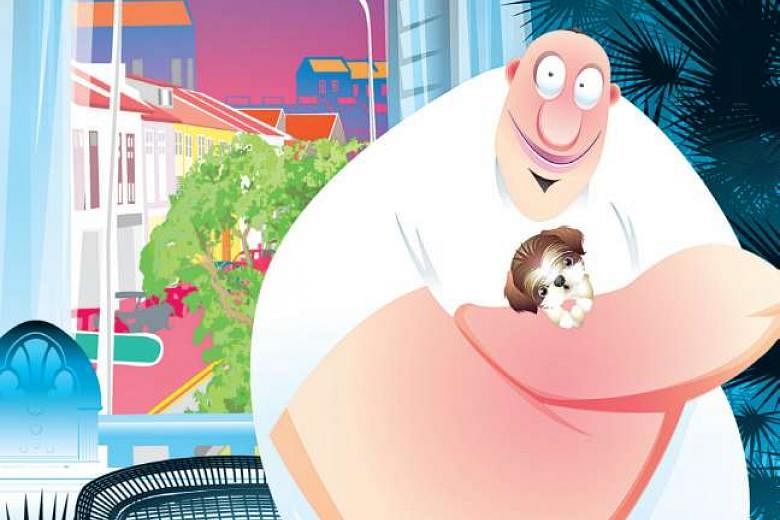My heart really sank when I read last week that most dogs do not like to be hugged.
This is according to a new scientific study of sorts published in the medical journal Psychology Today by psychology professor and neuropsychological researcher Stanley Coren.
Dr Coren says it was prompted by an argument with a psychology student at a university event, where she walked over and hugged his six-month-old retriever puppy.
He scolded her, saying that it raises the dog's stress levels.
She shot back, saying that development psychology studies show that hugging releases oxytocin, a hormone associated with loving and bonding.
So how could he say that hugging is not good for dogs, especially a puppy?

Dr Coren then went to look for scientific evidence that hugging is not good for dogs, but found none. So he decided to do his own study.
He analysed 250 random pictures posted online of human beings hugging dogs, using only photos where the dog's face was clearly visible in order to ascertain signs of stress.
He eliminated situations where something else other than the hug may have stressed the dog, such as lifting the dog high off the ground.
Of the 250 pictures he looked at, 81.6 per cent of them showed that the dog was showing one or more signs of stress or anxiety.
Only 7.6 per cent of the dogs looked like they were comfortable with being hugged.
The rest were neutral or ambiguous.
Commenting on his analysis, the professor made the somewhat sad and ironic observation that the photos he used were "obviously posts by individuals who wanted to show how much they cared for and shared a bond with their pet".
They probably chose photos in which they felt that both they and their dogs looked happiest, yet the dogs were anything but happy.
I don't know about you, but I hug my dogs every day.
Or at least one of them.
Dexter, my six-year-old shih tzu, is a bit small to satisfyingly hug.
In any case, as the temperamental top dog in the house, he has to be in the right mood to even contemplate receiving a hug. Often he just looks a bit grumpy and moves away as soon as he senses the tell-tale pincer shape of my arms going his way.
My younger dog, Juno, is an entirely different matter.
As a five-year-old Japanese spitz, she is a medium-sized dog so there is more to hug. Plus, she has lovely fluffy fur with Teflon-like resistance to dirt and that always smells amazing.
It helps that she is also one of those dogs that seem perpetually good-natured and happy. You look at her smiling at you and you just want to hug her.
And when I hug her, all my troubles magically melt away.
Juno has one of two expressions when I put my arms around her.
Sometimes she closes her eyes and sticks her tongue out, licking her lips. Her ears are slicked back and I have always interpreted this to be a typical "shiok" expression.
Yet according to Dr Coren, all these are classic signs of a dog feeling anxious or uneasy.
The other expression is a more doleful and wide-eyed look, looking straight ahead.
Apparently, this is also a sign of stress - the eyes are in what Dr Coren calls a "half-moon" position, with the whites of the eyes showing and the dog is also looking away from its owner, avoiding eye contact.
The professor explains that this "adverse" reaction is to be expected of dogs. They are cursorial animals designed for swift running, implying that when they are stressed, their first instinct is to run away.
But being hugged prevents them from doing that and as they become more and more anxious, their next instinct will be to bite.
This is why many guide books advise small children, especially, never to hug dogs.
Now, I find Dr Coren's studies to be generally credible. I've read a couple of his books and I respect his views.
He is probably most famous for publishing a ranking of dog breeds according to their intelligence, based on data collected from dog obedience judges in the United States and Canada.
For those who are curious, border collies, poodles and German shepherds top the list, with chow chows, bulldogs and Afghan hounds near the bottom.
But something in me has long wanted to rebel against snapping to yet another command from so-called dog psychologists.
The worst of these is television superstar and "dog whisperer" Cesar Millan.
He is well-intentioned enough, but I swear he drains all the joy and fun out of owning a dog.
Mr Millan believes that dogs are, by nature, pack animals that are happiest when they receive and obey clear instructions from their pack leaders.
The trouble with humans is that they often don't behave like pack leaders, leading to all sorts of problematic behaviour in their pet dogs.
The key to being a good pack leader, he says, is resisting the temptation to treat your dog like a human being.
As you read Mr Millan's books and watch his videos, you start to realise this means being very strict with your dog - so no enthusiastic jumping on you or the sofa, unless the dog is instructed to.
No unnecessary showing of affection from the owner is allowed, unless it is to reward good behaviour that you specifically asked for.
When your dog bounds up to you, tail wagging furiously, as you come through the door at the end of a long and frustrating work day, you have to ignore him totally and go about your affairs first - just so you can show who's the boss.
In fact, the ideal relationship is where the dog is always sitting quietly by the owner, alert and ready to obey his every command.
Mr Millan would have us believe this is true happiness for the dog.
Maybe he is right, but I often wonder about the happiness of the owners of such dogs.
People have dogs for companionship or to fulfil some sort of emotional need. What if they don't like that sort of relationship? Does that count for anything at all?
In any case, many owners already do so much for their dogs. Surely they are entitled to some payback on their own terms?
My dogs have the full run of the house around which dozens of squeaky toys are scattered, eat home-cooked food, enjoy air-conditioning 24 hours a day and go to daycare with their doggie buddies once a week, I grumbled to a colleague as we discussed Dr Coren's study last week.
I go for a haircut as often as they have their fur cut and groomed at a multiple of the cost. Surely they can endure two seconds of stress a day as their owner hugs them?
So I don't care, I want to hug my dogs.
"I dare you to say that!" was her reply. "All the animal activists will have you lynched!"
Since that is, in Singapore, a fate much worse than death, I will, of course, have to back down.
I will hug my dogs less often. Even though when I do it, Juno sometimes doesn't seem stressed at all - coming closer to me and turning her head around to lick my face.
And I will hug her for one second instead of two, just to cut down any uneasiness or unhappiness that she may feel.
I don't know if she will be that much happier for it.
I know I won't be.


